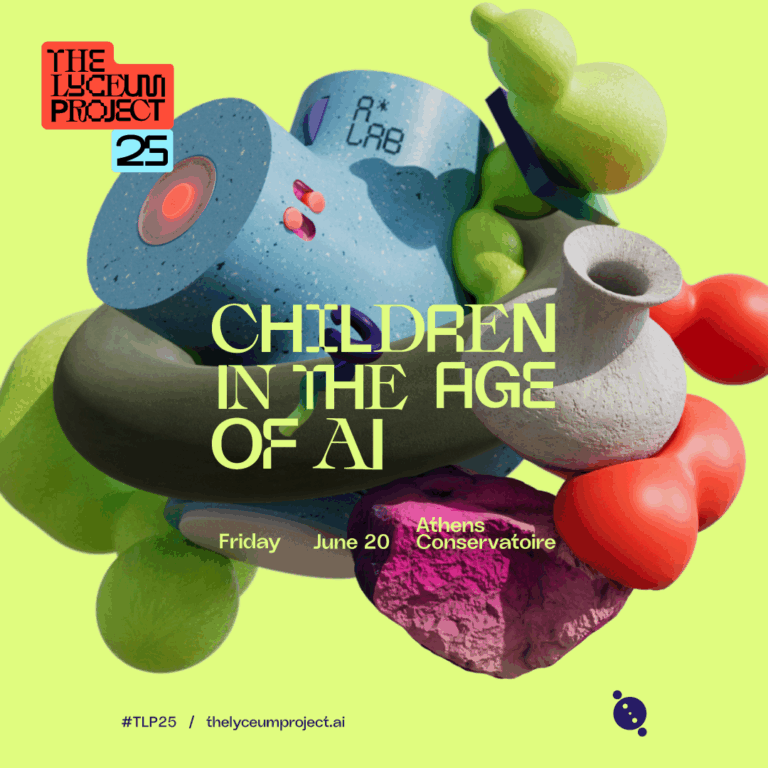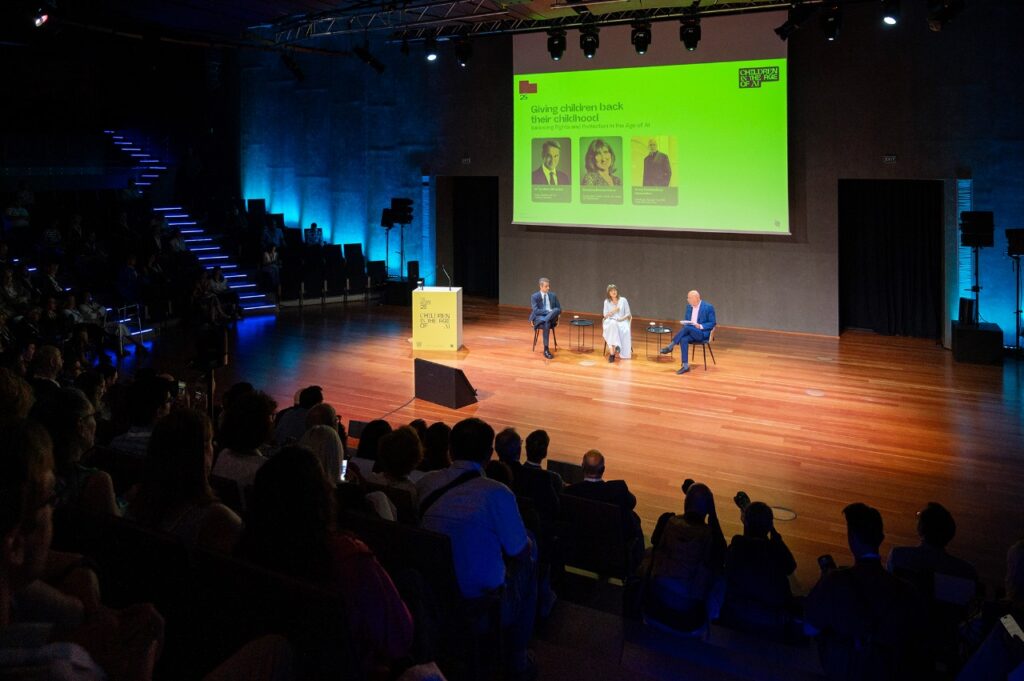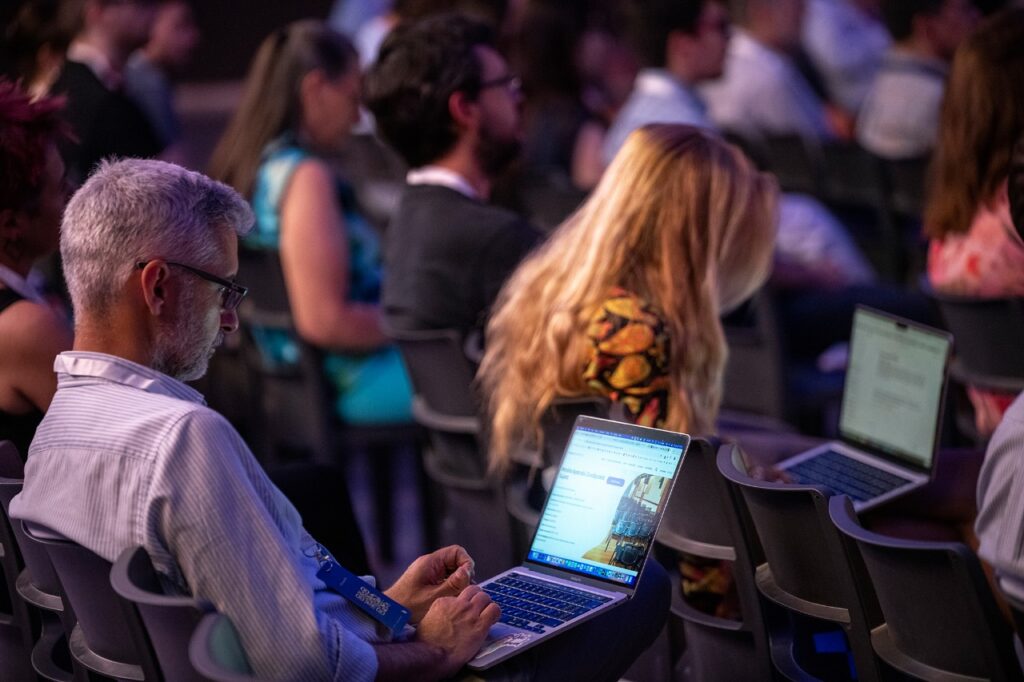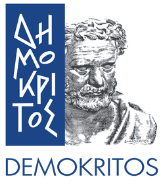The Lyceum Project 2025: Children in the Age of AI
An initiative for a global, open, and interdisciplinary dialogue
connecting Philosophy to AI

A day of reflection and dialogue on a vital question: How can we empower children, tomorrow’s citizens, to flourish in the age of AI?
On Friday, June 20, The Lyceum Project 2025, themed “Children in the Age of AI,” brought together a diverse community of distinguished thinkers, practitioners, policymakers, artists, and citizens at the Athens Conservatoire and the archaeological site of Aristotle’s Lyceum. The goal of this year’s gathering was to reflect and debate on what it means to be a child in the age of AI.
At a time when we are learning anew what it means to live and grow alongside AI, The Lyceum Project 2025 underscored the importance of recognising children’s voices and placing them at the heart of efforts to redefine what it means to be human. Amid a lively atmosphere of exchangιng ideas, the event paved the way for rethinking the values and childhood features we must safeguard to ensure that children can flourish in a world where AI is omnipresent.
The day unfolded with the participation of leading figures from the fields of ethics, AI, education, policymaking, and child development, featuring discussions on critical topics, keynote speeches, and a dedicated session with young researchers. Speakers explored how AI technologies can be guided with wisdom and integrity, and how all sectors influenced by AI, from governance and education to innovation, can be aligned with values that promote children’s well-being. The conversations revealed the opportunities and challenges of building an inclusive and ethical future with AI, a future that truly benefits the new generation.
A highlight of the event was the presentation of the “Philosophy Hub” at the archaeological site of Aristotle’s Lyceum, which is expected to be developed over the next period. The day concluded at the archaeological site of Aristotle’s Lyceum, with a site-specific artistic performance tailored to the unique character of the site.
The Lyceum Project 2025 in detail
The event was honoured by the presence of the Prime Minister of the Hellenic Republic, Mr Kyriakos Mitsotakis. The day began with welcoming remarks by Ms Alexandra Mitsotaki, President & Co-Founder of the World Human Forum, and Dr Georgios Nounesis, Director & Chairman of the Board of the NCSR “Demokritos”.
In a powerful opening dialogue, the Prime Minister and Baroness Beeban Kidron, Member of the House of Lords and Advisor to the Oxford Institute for Ethics in AI, joined moderator Dr Ing Konstantinos Karachalios to address the pressing need to balance children’s rights and protection in the age of AI. In his opening statement, the Prime Minister noted: “We need to pick our regulatory battles in a smart way […]. And for me, there are two battles I’ve decided to pick. The first is about democracy and how technology is actually interfering with the democratic debate. And the second is the protection of our kids and our teenagers.”
Next, Ms Eugenia Bozou, Head of Government Relations and Public Policy at Google for Greece, Cyprus, and Malta, delivered a keynote address about empowering the new generation through AI. As she noted, “AI is not magic. It brings challenges, but if we face them responsibly, we have a unique opportunity to create something extraordinary.”
The “AI Governance Panel” explored how regulation, ethical foresight, and legal responsibility must evolve to protect children in the age of AI. The panel participants were Prof Wayne Holmes (UCL), Mr Juraj Čorba (Ministry of Informatisation, Slovakia), Mr Alpesh Shah (IEEE Standards Association), and Prof Lilian Mitrou (University of the Aegean). As emerging technologies advance, the stakes affect all of humanity. “Good governance can lay the right foundations,” Mr Shah asserted.
Ms Tanya Perelmuter (Fondation Abeona) engaged in a conversation with Dr Lida Arnellou (NCSR “Demokritos”) on the importance of citizen education about AI, with particular emphasis on the role and participation of young women.
The “AI and Education” panel featured Prof. Zoe Gavriilidou (Democritus Univ. of Thrace), Asst Prof Spyridon Doukakis (Ionian Univ., President of the Institute of Educational Policy), Dr Giorgos Kosteletos (NKUA), Mr Christos Skarkos (Principal of the Vivlos Primary School in Naxos), and Prof Despina Karakatsani (Univ. of the Peloponnese). The discussion focused on the role of AI as a supportive tool in teaching and learning, as well as the need for education to adapt in ways that truly empower children. “In an era when technology is changing everything, we need to bring back interdisciplinarity and the connection of school subjects with everyday life”, according to Asst Prof Doukakis.
The morning concluded with the announcement of the five winners of the nationwide school exhibition “Growing Up in a World with Artificial Intelligence”, which invited students to reflect creatively on life with AI. Fifteen student projects were showcased during the event. Dr Dora Katsamori (NCSR “Demokritos”) served as the competition’s scientific lead. Maria Papadimitriou, a renowned contemporary visual artist from Greece, chaired the selection committee.
Dr Nicholas Prevelakis hosted the “Young Scholars’ Session”, which was held in affiliation with the Center for Hellenic Studies in Greece, Harvard University. The presentations focused on how AI impacts children’s agency, rights, and prospects in various contexts including education and governance.
Prof Panagiotis Pantazakos (NKUA) opened the evening program with a keynote speech on the role of education in the era of anthropomorphic AI, which imitates human traits, behaviours, and forms of interaction.
This was followed by the panel on “Age-Appropriate AI Design”. Asst Prof David Bickham (Boston Children’s Hospital), Dr Jun Zhao (Univ. of Oxford), Dr Sergio Imparato (Harvard Univ.), Ms Liz Thomas (Microsoft), and Dr Mhairi Aitken (The Alan Turing Institute) discussed how AI can be developed to meet the needs of children and their caregivers. They also emphasised the importance of strong interaction between research and innovation. As Dr Zhao noted, “We want to put children at the centre of the design process, to listen to their voices, to respect their needs”.
In the last panel of the day, Prof John Tasioulas (Director, Institute for Ethics in AI, Univ. of Oxford) and Prof Spyridon Rangos (Univ. of Patras), in a discussion moderated by Dr Maria Dagioglou (NCSR “Demokritos”), examined key philosophical questions about the role of AI in childhood. Prof Tasioulas pointed out that digital systems built to flatter and mirror our preferences risk displacing the challenges and personal growth that arise through genuine human relationships.
Prof. Anastasia Giannakidou, Frank J. McLoraine Professor of Linguistics at the Univ. of Chicago, summarised the key insights and themes that emerged throughout the day.
At the end of the event, Ms Antoinette Nassopoulos-Erickson, architect and Senior Partner at Foster + Partners, Ms Alexandra Mitsotaki, and Dr Vangelis Karkaletsis, Director of the IIT at NCSR “Demokritos”, announced the creation of a new Philosophy Hub at the archaeological site of Aristotle’s Lyceum. This initiative represents an inspired partnership between NCSR “Demokritos”, the World Human Forum, and the architectural firm Foster + Partners, with support from the Region of Attica and the Ministry of Culture.
Philosophy and AI met with art in the final act of The Lyceum Project 2025, when dance students from the Athens Conservatoire and musicians from the Contemporary Music Research Center presented the performance “The last human?” conceived specifically for the birthplace of the event’s inspiration: Aristotle’s Lyceum, the historic site of philosophical reflection. This symbolic return to the origins and roots of thought and ideas gave artistic form to the thoughts and emotions that emerged during the event, with an eye towards a more inclusive and meaningful future.
Acknowledgements
The Lyceum Project 2025 was organised by the National Centre for Scientific Research “Demokritos” and the World Human Forum, in collaboration with the Special Secretariat of Foresight, Presidency of the Government, Hellenic Republic and hosted by the Athens Conservatoire. It was held in affiliation with the Center for Hellenic Studies – Harvard University and the Center for Hellenic Studies at the University of Chicago, and supported by the IEEE Standards Association | IEEE SA and the Alexander S. Pissios Family Foundation.
Main Sponsor: Google
Official Airline Partner: AEGEAN
Official Media Partner: Athens News Agency – Macedonian Press Agency (ANA-MPA)
Future AI Leaders Sponsor: Hellenic Artificial Intelligence Society (EETN)
The Ephorate of Antiquities of the City of Athens granted permission to use the archaeological site of Aristotle’s Lyceum for the evening performance held as part of The Lyceum Project 2025.
What’s next
The Lyceum Project will return next year to continue the global, open, and interdisciplinary dialogue connecting Philosophy to AI for human flourishing, right where it all began, next to Aristotle’s Lyceum.
Until then, let us keep imagining and building the world we want to live in.
Video recordings of the event sessions will soon be available on The Lyceum Project’s official YouTube channel https://www.youtube.com/@TheLyceumProject-official.
Press Contacts
Dr Eva Steiner-Karatairi, NCSR Demokritos
📞+30 6976723464 / 📧 eva.karatairi@gmail.com
Ioanna Gkomouza, Communications Officer, World Human Forum
📞 +30 6973827508 / 📧 ioanna@worldhumanforum.earth
Social Media:
The Lyceum Project LinkedIn Page
The Lyceum Project Facebook Page
#TheLyceumProject #TLP25
About The Lyceum Project
Set in the cradle of philosophy, next to the archaeological site of Aristotle’s Lyceum, The Lyceum Project is a global initiative connecting philosophy and AI that comes alive each year on June 20. Organised by leading academic institutions, research centres, and global organisations, visionary thinkers and doers, The Lyceum Project bridges timeless philosophical wisdom with groundbreaking AI innovation.
The Lyceum Project uncovers insights and offers pathways that guide technology toward sustaining and enriching the interconnected web of life. This modern Lyceum provides a space where philosophy, science, the arts, and humanities converge to tackle the greatest challenges of our time.
The inaugural edition of The Lyceum Project in 2024 introduced an Aristotelian ethical framework to address AI’s challenges and opportunities, as outlined in the white paper “Lyceum Project: AI Ethics with Aristotle” by John Tasioulas, Professor of Ethics and Legal Philosophy, and Director of the Institute for Ethics in AI at the University of Oxford, and Josiah Ober, Professor of Political Science and Classics at Stanford University. This framework continues to guide the project’s vision.
The Lyceum Project aligns with the “Statement on Inclusive and Sustainable Artificial Intelligence for People and the Planet,” signed at the Artificial Intelligence Action Summit in Paris in February 2025, to promote inclusive and multi-stakeholder dialogues and cooperation on AI governance.
The Lyceum Project also fulfils the convening function of one of the Flagship Programmes in “Greece’s AI Transformation Blueprint” and serves as the venue for an annual high-level global meeting on AI ethics and policy.
About the organisers
The National Centre for Scientific Research (NCSR) “Demokritos” is Greece’s largest multidisciplinary research centre. NCSR “Demokritos” plays a key role in national and European AI initiatives through its Institute of Informatics and Telecommunications and AI research activities.
The World Human Forum is a think-and-do tank, a knowledge and action hub designed to help build a brighter future for all. A global citizens’ initiative which highlights and interconnects the innovative forces of our planet towards the creation of a genuine ecological civilisation.
The Special Secretariat of Foresight, under the Presidency of the Government, Hellenic Republic.
The Athens Conservatoire (Greek: Odeion Athinon) is the oldest educational institution for the performing arts in modern Greece, founded as a non-profit organisation in 1871. Its premium location at the heart of Athens and its iconic building make it a unique and enviable cultural hub for various contemporary arts and cultural events.
The Center for Hellenic Studies – Harvard University is dedicated to the reassertion of the humanism of the ancient world, centring on Hellenic civilisation in its widest sense. Today, it stands as a premier research facility, cultivating a repository of materials that attracts scholars, researchers, and students from all over the world.
The Center for Hellenic Studies at the University of Chicago is a forum for research, pedagogy, and engagement with the many aspects of the Hellenic civilisation from antiquity to the modern day.
The IEEE Standards Association SA is a leading consensus-building organisation that nurtures, develops, and advances global technologies. It facilitates standards development and standards-related solutions, such as technology incubation, alliance consortia formation and open source.
The Alexander S. Pissios Family Foundation is a non-profit organization committed to supporting underprivileged and underserved communities both locally and globally by creating transformative opportunities in education, employment, and social services, thereby empowering individuals to thrive.
Organized by


In Cooperation with
Hosted by
In Affiliation with
Supported by


Main Sponsor
Official Airline Partner
Future AI Leaders Sponsor
Media Partner
